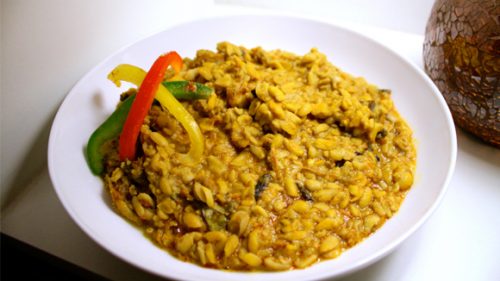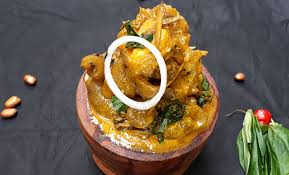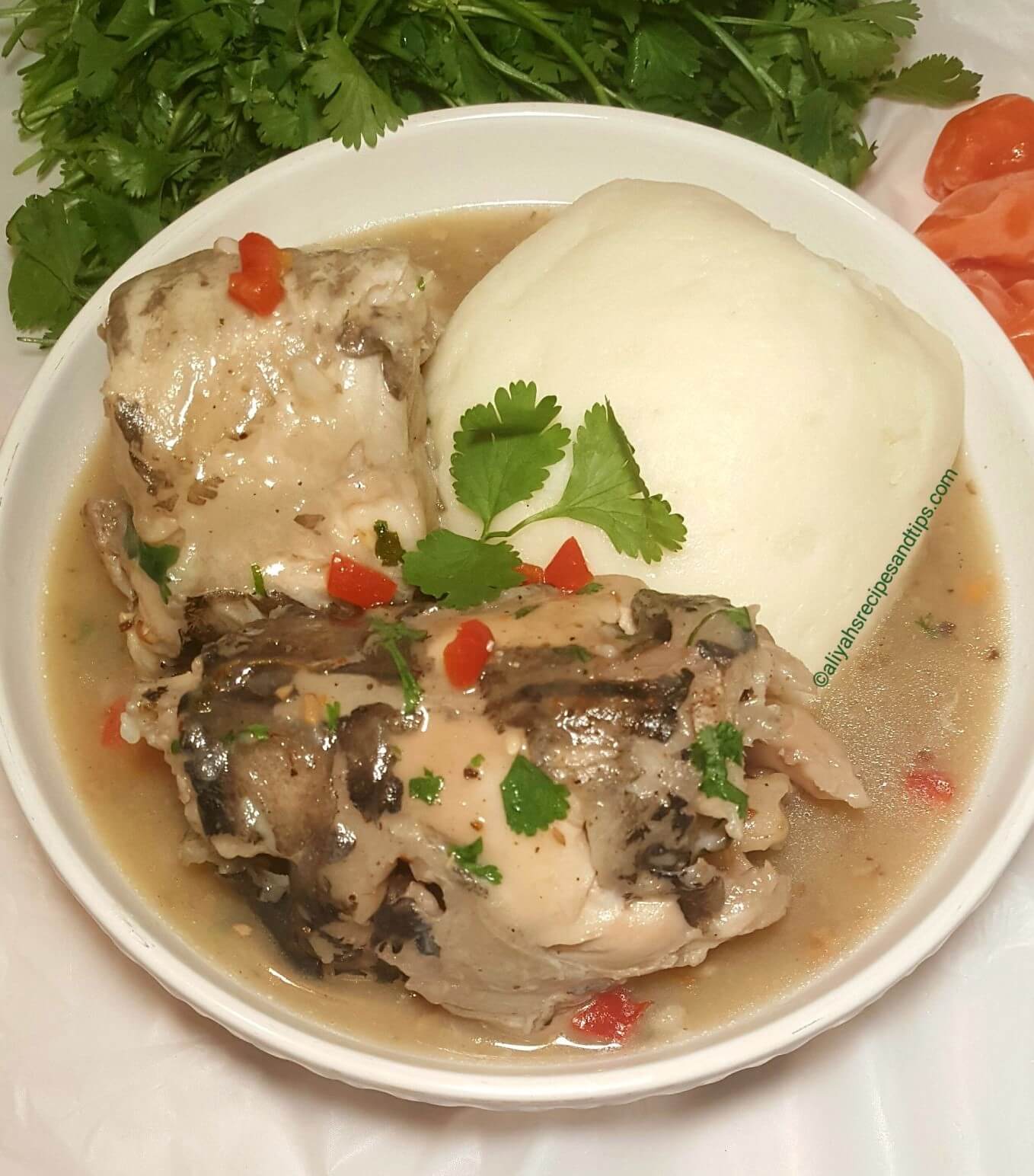
Ukwa: A Traditional Igbo Delicacy

Ukwa, also known as African breadfruit, is a beloved and nutritious dish native to the Igbo people of Southeastern Nigeria. Rich in protein, fiber, and essential nutrients, Ukwa has been a staple in Igbo cuisine for generations. This hearty and wholesome dish is cherished not only for its unique taste and texture but also for its cultural significance and the memories it evokes for those who grew up enjoying it. In this comprehensive guide, we'll explore the origins of Ukwa, its nutritional benefits, and provide a step-by-step recipe to help you prepare this traditional dish at home. Whether you're familiar with Ukwa or discovering it for the first time, this post will give you all the tools you need to create a delicious and authentic Igbo meal. The Origins of Ukwa Ukwa, scientifically known as Treculia africana, is a tropical fruit tree native to West Africa. The edible seeds of the African breadfruit are the main ingredient in the dish known as Ukwa. This tree thrives in the humid and tropical climates of Nigeria, where it is widely cultivated and harvested. Ukwa has long been a symbol of sustenance and prosperity in Igbo culture. It is often served at special occasions such as weddings, festivals, and communal gatherings, where it brings people together to share in its rich flavor and nourishing qualities. For many, the preparation and enjoyment of Ukwa is deeply intertwined with family traditions and cultural heritage. Nutritional Benefits of Ukwa Ukwa is not only delicious but also packed with nutrients that make it a valuable addition to any diet. Here are some of the key nutritional benefits of Ukwa: High in Protein: Ukwa is an excellent source of plant-based protein, making it a great option for vegetarians and those looking to add more protein to their diet. Rich in Fiber: The high fiber content in Ukwa aids digestion and helps maintain a healthy digestive system. Low in Fat: Ukwa is naturally low in fat, making it a heart-healthy food choice. Packed with Vitamins and Minerals: Ukwa contains essential vitamins and minerals such as vitamin C, calcium, potassium, and magnesium, all of which contribute to overall health and well-being. Gluten-Free: For those with gluten sensitivities or celiac disease, Ukwa is a naturally gluten-free option. Ingredients for Preparing Ukwa To prepare Ukwa, you will need the following ingredients: Ukwa Seeds: 2 cups of dried Ukwa seeds (African breadfruit) Water: Enough to cover the Ukwa seeds for soaking and cooking Potash: 1 teaspoon (optional, helps soften the Ukwa seeds) Palm Oil: 2-3 tablespoons Crayfish: 2 tablespoons, ground Onions: 1 medium-sized onion, finely chopped Fresh Pepper: 1-2 Scotch bonnet peppers, finely chopped (adjust to taste) Dried Fish or Stockfish: 1 cup, soaked and deboned Seasoning Cubes: 1-2 cubes (Maggi or Knorr) Salt: To taste Bitterleaf or Scent Leaf: A handful, washed and chopped (optional, for garnish) Step-by-Step Guide to Preparing Ukwa 1. Preparing the Ukwa Seeds Ukwa seeds are typically sold in dried form, so the first step in preparing this dish is to soak and soften the seeds. Here's how to do it: Soak the Ukwa: Place the dried Ukwa seeds in a large bowl and cover them with water. Allow them to soak for at least 4-6 hours, or overnight if possible. This helps to soften the seeds and reduce cooking time. Rinse and Drain: After soaking, rinse the Ukwa seeds thoroughly under cold water and drain them using a colander. 2. Cooking the Ukwa Once the Ukwa seeds are prepped, it's time to start cooking: Boil the Ukwa: In a large pot, add the soaked Ukwa seeds and enough water to cover them. If you're using potash, add it to the pot at this stage. Potash helps to soften the seeds further and speed up the cooking process. Bring the pot to a boil over medium heat. Simmer Until Soft: Once the water reaches a boil, reduce the heat to low and let the Ukwa simmer for about 1-2 hours, or until the seeds are soft and tender. Check the pot occasionally and add more water if necessary to prevent the Ukwa from drying out or burning. Drain Excess Water: Once the Ukwa is fully cooked and soft, drain any excess water from the pot. 3. Preparing the Sauce The next step is to prepare the flavorful sauce that will be mixed with the cooked Ukwa: Heat the Palm Oil: In a separate saucepan, heat the palm oil over medium heat until it becomes translucent. Be careful not to overheat the oil, as this can affect the flavor. Sauté Onions and Pepper: Add the chopped onions and fresh pepper to the palm oil and sauté until the onions are soft and translucent. The pepper adds a nice kick to the dish, but you can adjust the amount to suit your taste. Add Crayfish and Fish: Stir in the ground crayfish and the soaked, deboned dried fish or stockfish. Let the mixture cook for a few minutes until the flavors meld together. Season: Add the seasoning cubes and salt to taste. Stir well to ensure the seasoning is evenly distributed. 4. Combining the Ukwa with the Sauce Now that both the Ukwa and sauce are ready, it's time to bring the dish together: Mix the Sauce with the Ukwa: Gently pour the prepared sauce into the pot of cooked Ukwa. Stir the mixture well to ensure the Ukwa seeds are evenly coated with the sauce. Simmer Together: Allow the combined mixture to simmer on low heat for an additional 10-15 minutes. This step allows the flavors to fully penetrate the Ukwa seeds, making the dish even more flavorful. 5. Garnishing and Serving Finally, garnish and serve your Ukwa: Add Leaves: If you're using bitterleaf or scent leaf, add the chopped leaves to the pot just before serving. These leaves add a slight bitterness and a fresh, herbal flavor that complements the richness of the dish. Serve Hot: Ukwa is best enjoyed hot, either on its own or with a side of fried plantains, yam, or vegetables. It can also be paired with a refreshing drink like palm wine or a cold beverage of your choice. Tips for the Perfect Ukwa Quality Ingredients: The quality of the Ukwa seeds and other ingredients plays a significant role in the final taste of the dish. Use fresh, high-quality Ukwa seeds and ensure that your palm oil is free from impurities. Cooking Time: Be patient while cooking Ukwa. The seeds need to be fully softened to achieve the right texture. If you're short on time, consider using a pressure cooker to speed up the process. Adjusting Spice Levels: Ukwa can be as mild or as spicy as you like. If you prefer a less spicy dish, reduce the amount of fresh pepper or omit it altogether. Nutritional Information and Health Considerations Ukwa is not only a delicious traditional dish but also a nutritious one. Here's a quick overview of its nutritional benefits: Calories: A serving of Ukwa is relatively low in calories, making it a great option for those looking to maintain a balanced diet. Protein: Ukwa is an excellent source of plant-based protein, essential for muscle growth and repair. Fiber: The high fiber content aids in digestion and helps keep you feeling full for longer. Vitamins and Minerals: Ukwa provides a good amount of essential vitamins and minerals, including vitamin C, calcium, and potassium. Conclusion Ukwa is more than just a meal; it's a celebration of Igbo culture and tradition. Whether you're preparing it for a special occasion or simply enjoying it as a comforting home-cooked meal, Ukwa brings with it the warmth and richness of Nigerian cuisine. With its nutty flavor, tender texture, and hearty sauce, Ukwa is sure to become a favorite in your culinary repertoire. By following this guide, you'll be able to prepare a delicious and authentic Ukwa dish that honors its traditional roots while also appealing to modern tastes. So gather your ingredients, take your time with the preparation, and savor the flavors of this classic Igbo delicacy. Enjoy!

